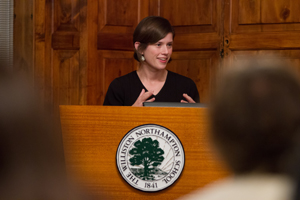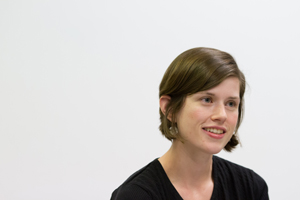 “This day was not so much a surprise to those of us who knew her well,” said Peter Gunn as he introduced his former student, Jennifer duBois ’02, author of, A Partial History of Lost Causes and recently named one of the National Book Foundation’s Five Under 35.
“This day was not so much a surprise to those of us who knew her well,” said Peter Gunn as he introduced his former student, Jennifer duBois ’02, author of, A Partial History of Lost Causes and recently named one of the National Book Foundation’s Five Under 35.
It was a night of memories as duBois, who participated as a student in the Writers’ Workshop series, became the first alumna to also return as a guest author in the program.
As a student duBois studied The Odd Sea, written by Frederick Reiken, and was greatly influenced by something he said at her Writers’ Workshop. She was having trouble grasping the truth in writing something she hadn’t experienced firsthand and Reiken said, “You write what you know, but you know more than you think you know.”
From that point on duBois felt she had been given permission to write stories that stretched farther than her own experiences allowed. Whole worlds opened up to her.
As a child, “I had more than imaginary friends,” she said. “I think I had whole imaginary mythological systems. Then it clicked, those were my stories; you write those down now.”
“We all look to our lives for inspiration in our fiction writing, but I think we can get in trouble sometimes when we see our lives as parameters instead of possibilities,” said duBois.
“I didn’t play chess in Soviet Russia, newsflash,” she said to uproarious laughter. The novel, duBois’ first, follows Irina, recently diagnosed with Huntington’s disease, as she travels to Russia in search of chess prodigy Aleksandr  Bezetov. Before his demise from Huntington’s, Irina’s father had sent Bezetov a letter asking him: How does one proceed in a lost cause? From there, duBois formed a narrative centered around the search for sense and meaning within that context.
Bezetov. Before his demise from Huntington’s, Irina’s father had sent Bezetov a letter asking him: How does one proceed in a lost cause? From there, duBois formed a narrative centered around the search for sense and meaning within that context.
“In my case, my father had Alzheimer’s disease when I was growing up,” she said. “So that’s where a lot of Irina’s questions about cognitive and personal identity, and what do you do when you’re in a situation that is bad A. and preordained B. come from.”
However, Aleksandr’s story, she said, was based more on curiosity and an interesting journey. Yet “there’s that small grain of emotional connection there; even though those situations are wildly different; there’s some sort of sympathy and relationship between them,” said duBois.
“I went [to Russia] as a very small child which was kind of, I think, what sparked my imagination in terms of Russia,” said duBois. Later, as an adult, she had a chance to return but it came after she had drafted the book. While there, recounted duBois, she fact checked and was even able to include a few of her experiences in the plot line.
“But mostly the research I did was reading on the Internet and looking at stranger’s vacation photos on Flickr,” she said.
After a short reading duBois answered questions and shared some important advice with the Writers’ Workshop students, “Title your book before you write it,” she said, “it’s a really unique sense of panic having a completed novel with no title.”
 Asked if she thought her book had made a big enough stir that she would not be allowed back into Russia, duBois replied, “I think Putin’s got bigger problems.”
Asked if she thought her book had made a big enough stir that she would not be allowed back into Russia, duBois replied, “I think Putin’s got bigger problems.”

